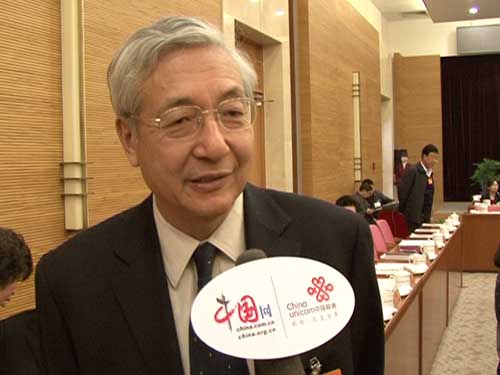Xu Zhihong talks about higher education issues
The Chinese government is currently surveying public opinion regarding the Long-Term Education Reform and Development Outline 2010-2020. Xu Zhihong, NPC deputy and member of the Chinese Academy of Sciences, shares with China.org.cn his ideas about China's higher education system.
 |
|
Xu Zhihong talks with China.org.cn. [China.org.cn] |
China.org.cn: What do you believe is the role of higher education?
Xu Zhihong: Fostering creative talents is the duty of all higher-education institutes in China, especially for the top universities. Everyone has been talking about what qualities intelligent individuals should possess. I think this issue involves more than just the students themselves, as it also has something to do with the social and economic environment they grow up in. China is now experiencing great changes from the transition of a planned economy to a market economy. Education, as an indispensable part of society, is reforming along with other areas of society.
Premier Wen Jiabao once said, 'We are now facing a lot of dilemmas.' Reforming the higher education system cannot be done independently because it is closely related to the whole education system. As the reform goes deeper and deeper, we will find a lot of fundamental difficulties. For example, universities need a free environment to foster outstanding students. However, the current primary and middle school education pattern and college entrance examination kill children's creativity. Thus education is a huge social project.
Although the government is now determined to reform and support the education system, there are many problems that have formed during the past tens of years. We need to take our time to establish the specific goals that are needed to solve all the problems. The reform will involve tens of thousands of families, so we cannot apply one method to all of the cases.
China.org.cn: What's your opinion on equal access to education?
Xu: Actually, in my mind, 'equal education' is a relative concept. Higher education is not compulsory. These days, college tuition in China is mostly paid for by the government; students pay a relatively smaller part. So 'equal access to education' means that everyone has an equal opportunity to compete. If talking about different admission ratios for different provinces, we can turn to the US higher education system. Public/state-run universities charge in-state students less tuition than those students who are out-of-state and do not pay the state's taxes. So I'll say 'equal education' is not an absolute term.
 0
0 







Go to Forum >>0 Comments